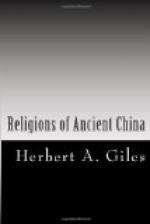The two Terms are One.—That the two terms refer in Chinese thought to one and the same Being, though possibly with differing attributes, even down to modern times, may be seen from the account of a dream by the Emperor Yung Lo, A.D. 1403-1425, in which His Majesty relates that an angel appeared to him, with a message from Shang Ti; upon which the Emperor remarked, “Is not this a command from T’ien?” A comparison might perhaps be instituted with the use of “God” and “Jehovah” in the Bible. At the same time it must be noted that this view was not suggested by the Emperor K’ang Hsi, who fixed upon T’ien as the appropriate term. It is probable that, vigorous Confucianist as he was, he was anxious to appear on the side rather of an abstract than of a personal Deity, and that he was repelled by the overwrought anthropomorphism of the Christian God. His conversion was said to have been very near at times; we read, however, that, when hard pressed by the missionaries to accept baptism, “he always excused himself by saying that he worshipped the same God as the Christians.”
God in the “Odes.”—The Chou dynasty lasted from B.C. 1122 to B.C. 255. It was China’s feudal age, when the empire, then included between latitude 34-40 and longitude 109-118, was split up into a number of vassal States, which owned allegiance to a suzerain State. And it is to the earlier centuries of the Chou dynasty that must be attributed the composition of a large number of ballads of various kinds, ultimately collected and edited by Confucius, and now known as the Odes. From these Odes it is abundantly clear that the Chinese people continued to hold, more clearly and more firmly than ever, a deep-seated belief in the existence of an anthropomorphic and personal God, whose one care was the welfare of the human race:—
There is Almighty God;
Does He hate any one?
He reigns in glory.—The soul of King Wen, father of the King Wu below, and posthumously raised by his son to royal rank, is represented as enjoying happiness in a state beyond the grave:—
King Wen is on high,
In glory in heaven.
His comings and his
goings
Are to and from the
presence of God.
He is a Spirit.—Sometimes in the Odes there is a hint that God, in spite of His anthropomorphic semblance, is a spirit:—
The doings of God
Have neither sound nor
smell.
Spiritual Beings.—Spirits were certainly supposed to move freely among mortals:—
Do not say, This place
is not public;
No one can see me here.
The approaches of spiritual
Beings
Cannot be calculated
beforehand;
But on no account should
they be ignored.
The God of Battle.—In the hour of battle the God of ancient China was as much a participator in the fight as the God of Israel in the Old Testament:—




